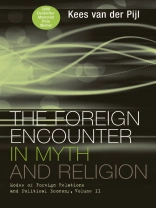How do we think about international relations? There is no question that society is based upon its cultural foundations, yet this mode of understanding the world is seemingly absent from IR.
The second volume of Modes of Foreign Relations and Political Economy, a three-volume project changing the way we think about international relations, traces the key characteristics of ‘foreign encounters’ over time. It shows that myth, religion and ethical philosophies have always informed the way that societies have interacted with outsiders, from tribal relations to the imperial frontiers. Acceptance of this points us towards the future state of international relations.
A truly masterful work, The Foreign Encounter In Myth And Religion, is a must for upper-undergraduates and academics at the cutting edge of international relations theory.
Table des matières
Preface
Acknowledgements
1. Tribal Foreign Relations and Mythical Ancestry
2. Sedentary-Nomad Encounters in Semitic Myth and Religion
3. Warrior Heroes in the Indo-European Lineage
4. Imperial Cosmologies and the Nomadic Counterpoint
5. Rival Fundamentalisms on the Imperial Frontier
References
Index
A propos de l’auteur
Kees van der Pijl is a Fellow of the Centre for Global Political Economy and Professor Emeritus at the University of Sussex. His books include The Disciple of Western Supremacy (Pluto, 2014) The Foreign Encounter in Myth and Religion (Pluto, 2010), the Deutscher prize-winning Nomads, Empires, States (Pluto, 2007).












